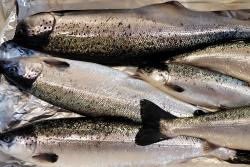Healthy gut microbiomes can influence farmed fish
Weтve all probably heard or read something about how a healthy gut microbiome can affect our overall health. The gut microbiome is as vital to animals and fish as it is to us humans.
We have microbiomes in different parts of our bodies, on our skin, for example. Т
Microbiomes are made up of communities of different microorganisms, viruses and germs and these communities play an important role in the way in which we function. There is even evidence to show that a poor gut biome can lead to ill-health or even disease.
 With around 45% of the fish we buy and eat globally coming from farmed sources, understanding the fish gut microbiome is essential to supply this demand.
With around 45% of the fish we buy and eat globally coming from farmed sources, understanding the fish gut microbiome is essential to supply this demand.
The aquaculture or fish farming industry is therefore driving this area of research in order to improve the health of farmed fish. This in turn should bring benefits in terms of a healthier fish and therefore, ultimately cheaper and higher quality produce for the consumer.
Researchers at ЯуИлСљКЯВЪЙвХЦзЪСЯ and the Universities of Glasgow, Stirling and Liverpool John Moores have reviewed and drawn together research conclusions, and highlighted knowledge gaps and useful areas of further research.Т Their paper is published in the research journal Proceedings of the Royal Society B. ()
Will Perry, lead author and ЯуИлСљКЯВЪЙвХЦзЪСЯ School of Natural Sciences PhD student explains:
тThe gut microbiome is vital for healthy fish growth and plays a role in fighting disease. The microbiome contributes to the fishтs ability to digest and make use of fatty acids and vitamins.
 An image of PhD student Will Perry in the labs at ЯуИлСљКЯВЪЙвХЦзЪСЯ.However, the fact that fish are farmed can affect their gut microbiome, through changes in diet, the introduction of other inputs to maintain health, like antibiotics, and high population densities.
An image of PhD student Will Perry in the labs at ЯуИлСљКЯВЪЙвХЦзЪСЯ.However, the fact that fish are farmed can affect their gut microbiome, through changes in diet, the introduction of other inputs to maintain health, like antibiotics, and high population densities.
As with humans, a dose of antibiotics can mess around with the microbiome in the gut and can harm helpful bacteria. Over-use of antibiotics can also lead to antibiotic resistance in fish as with animals and humans.
One response is the development of alternatives to antibiotics, including the application of vaccines, through injecting the fish, immersing the fish in the vaccine, or feeding the fish the vaccine.
Alternative proteins are also increasingly used to feed fish, including those derived from plants and insects. But these have different effects on the microbiome, and benefits can vary between different fish species, with scope for further research.т
Elle Lindsay, a PhD student and researcher at the University of Glasgow added:
тIt is both an exciting and challenging area of research, because so many factors can impact the gut microbiome: it can even change over an individualтs development. Most studies look at the impact of one factor, such as diet, on the gut microbiota, so it has been helpful to compile all the research and gain greater insight. We can now begin to understand the complex interactions between a fish host, its gut microbiota and the environment.т
PhD student Chris Brodie of Liverpool John Moores University said:
тNew technology and techniques developed to increase the efficiency of fish farming can inadvertently change the natural order of microbes living inside fish. This review highlights some of the key impactsт aquaculture is having on the health of farmed fish from the changes it is having on the gut microbiome.т
тItтs a highly complex area" concludes Will Perry,
тand although research has come a long way, we need to understand more about the composition and function of the gut microbiome in fish. This is a challenge because it involves the combination of multiple cutting edge molecular techniquesт
This work brings together expertise from researchers across multiple Universities, including the Molecular Ecology and Fisheries Genetics Laboratory (MEFGL), ЯуИлСљКЯВЪЙвХЦзЪСЯ, the Institute of Biodiversity, Animal Health & Comparative Medicine, University of Glasgow, the Institute of Aquaculture, University of Stirling and the School of Biological and Environmental Sciences, Liverpool John Moores University. The work was published with funding from the Natural Environment Research Council (NERC).
